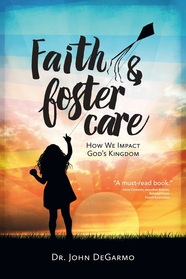
As foster parents, we are to help those children placed in our home to heal. We do it a number of ways, yet love is at the core. When we love children in foster care with all that we have, we help them to begin to heal.
Yet, it is just not the children in our homes that may need to heal. So many times, the birth parents and biological family members of our children from foster care are suffering themselves. So many have been victims, themselves. So many have been foster children, themselves. Indeed, two of my own adopted from foster care, Cassie and Brailey, are third generation foster care, as their mother and grandmother were also in foster care (as I write about in the book Love and Mayhem: One Big Family’s Uplifting Story of Fostering and Adoption).
As foster parents, we have the opportunity to not only help children in need, but their parents, as well. As we have seen, we can forgive their actions and crimes against the very children we share in common. There are a number of other ways we can help our foster child’s biological family members. There are a number of ways we can help them to heal from their own trauma and anxieties.
To begin with, we can simply model being not only a good parent but an example by staying positive and keeping a good attitude, even in the midst of trying times and difficult challenges. I remember one time, where a birth parent was cursing at me in front of the caseworker, calling me horrible names and making false accusations against my wife and me about how we were treating her child. The caseworker was relatively new at her job, and did nothing to intervene on my behalf, and instead sat there, next to me, and allowed the birth parent to continue in her attacks. At first, I felt my blood pressure rise, my heart began to race, and I wanted to lash out in defense. Instead, I folded my hands together, and prayed silently to myself. When the birth mother rose from the table we were sitting at and spat in my face, I prayed even harder, and remained calm. Can I be honest with you? It wasn’t very easy for me. Without a doubt, though, it would have only created more problems if I had met her attach with one of my own. I would have also not have honored the foster child in my home by treating the child’s mother in such a fashion.
Join the thousands who receive Dr. DeGarmo’s FREE foster care newsletter. Simply fill out the form below.
Not only can we stay positive and keep a good attitude, we can also treat our foster child’s birth parents with the same dignity, respect, and kindness that we would have shown to us. Indeed, one of the best ways we can show this is by treating all we meet with these attributes, even if it is not returned. Even more, we need to forgive them for what they have done to those children who are living in our homes. Indeed, as I write about HERE, this frees us from any negative feelings and anxieties of our own, and allows us to focus our attention on what we truly need to be doing.
As we both know, the end goal and hope filled desire is for reunification between the child and the parent. At the same time, as we also both know, this is not always the case, for a variety of reasons. Yet, even if the child does not return to his birth family, the child’s parents still need our help. They still need us to be examples, treat them with dignity and kindness, and even to pray for them. They need us, as fellow human beings, to lend a helping hand, and to help them heal. Is it always easy? No. Is it important? Absolutely. May we all do likewise. May we help all those who are suffering and in pain to begin their own healing process.
-Dr. John
The book that is "Changing the Face of Foster Care!" Get your signed copy of Dr. John's newest book-Faith and Foster Care: How We Impact God's Kingdom. The book that may change how you look at foster parenting. Click HERE for your copy.


 RSS Feed
RSS Feed